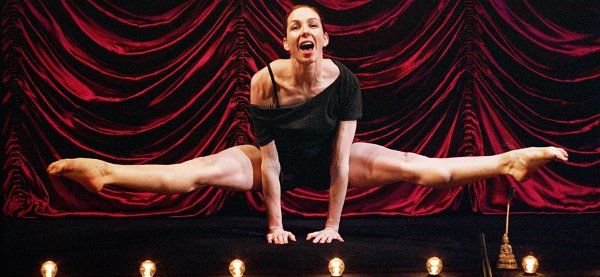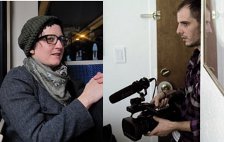
Tanja Liedtke was a powerful, up and coming force in the world of dance before her untimely death at just 29 years old. Tragically, the cosmopoltian choreographer - born in Germany, schooled in Britian and living in Australia - was knocked down and killed just after being appointed the artistic director of the highly respected Sydney Dance Company. Life In Movement - screening at FilmFest Australia this week - is a celebration of her art that goes far beyond the machinations of her life and the memorial tour that her friends embark on, to encompass questions regarding the nature of creativity and grief.
That the resulting film is an emotional ride is perhaps no surprise when you learn that co-directors Bryan Mason and Sophie Hyde (partners in the film business and life) had a very personal connection to Tanja and her partner Sol Ulbrich.
"Sophie, my partner, and I knew Tanja and Sol for years," says Bryan. "As they were kind of coming up through the world of dance, Sophie and I were mirroring their rise but in film, building our company in as they were building what they did. So we knew them very well - it was quite a personal film to make on that level.
"Coming into making the film I was a little apprehensive, thinking is this going to be really hard and kind of unsure of a. where the film would go and b. what the story of the film would be, whether it would be a positive thing or a really difficult thing. In the process of making it painfully, it ended up being a positive way of dealing with a really shit thing that happened. This accident as horrific, someone so young and with so much promise dying. It was had a real finality and void about it. And I guess being able to funnel our energy into making a film about her - it's more than just about her, it's about the loss of a creative partnership and how the people who were working with Tanja deal with that loss and how they grieve. I guess, through that, you get to know who Tanja was an explore who she was. It felt like a really positive way for us to deal with that."
Having the personal connection to Tanja might have posed some problems for the filmmakers but it was also the spur for them to take on the project in the first place. "One of the real drives for me to make the film was the media coverage around the accident at the time," says Bryan. "It was all, 'We'll never know what would have been', 'Maybe this girl would have done something good', that was the slant of the articles. For Sophie and I, having known those guys and seen their work, we knew that she already was doing really amazing stuff and interesting work and that drove us to want to make the film even more. Granted, we don't know what would have been but we can show you that it would have been pretty good."
"Pretty good" sounds like something of an understatement after watching Sophie and Bryan's film, which was nominated for the Australian Film Institute's best documentary award and has picked up a clutch of accolades on the festival circuit. They show Tanja as a driven and skilled choreographer, who was also able to bring the best out in those around her.

"The real kind of spark, the heart of the shows which were so well received around the world, obviously was Tanja,"says Bryan. "She was such a driving force. When we came to make the film, it was really strong in our minds that we wanted as much as we could for Tanja's presence to be felt and for her voice to be strong in the film. Whether it was her voice through her choreography or her voice through the inspiration she has given through the people she worked with."
To keep Tanja front and centre in the film is no easy feat, but the directors were lucky in having Sol's trust and in being granted access to of more than 80 hours of personal footage of Tanja, from videos of rehearsals to more intimate film of her working through her ideas in the middle of the night. Bryan says that editing it all back to the final cut was no easy task.
"I've never made a project which was harder than this," he admits. "To have an 84-hour archive. Sol and I sat and went through it all and short-listed the stuff that just had to be in the film... and we ended up with 11 hours. I think, at that point, we realised we are not making an 11-plus hour film - that's step one then. It was hard to assimilate that kind of material, even just to know what was there."
But for all the difficulties, the archive was also a huge help.
"You see the progression of this work go from genesis in to her then directing it on to other people and it becoming part of the show." says Bryan "I think it was only by going through all that footage that we started to see that Tanja can really be a part of the film even though she has passed. So it was quite a joy and a privilege to have access to that archive and that amount of someone's life that they'd documented."
Bryan's first cut of the film came in at two and a half hours and had a linear progression through Tanja's life. He admits that it was quite a funny moment when he showed the result to Sophie, whe promptly told him it was fantastic but not the film they were after. More "hunkering down in the edit suite" later and the pair realised that the memorial tour undertaken by Tanja's former colleagues should form the backbone of the film.
"We restructured it and found contained within that tour, was the journey of grieving," he says "These guys doing the work and coming back to this thing. When Tanja was around, the work was such an organic, live thing - if they had a five-night season, the show on the fifth night would be a very different thing to the show on the first night. Tanja was always engaged, saying, 'Let's rework this scene or I've got another idea.' So the shows were constantly morphing and changing and growing.
"When the cast came back to do the work after Tanja's death it was quite a different thing for them. They came back and decided to do the shows the same way that they had done them the last time with Tanja. So rather than it being this organic, breathing thing, it became a time capsule. I think it was a really tough and brave call to try to remount the show. And I think in doing that, you had these extra realisations but, at the same time, they realised during the process of the film that they need to let go and that when the tour comes to an end, it's not before time. I think it's fantastic that they did the tour and I think everyone involved would atest to that. But I think in the process of doing that, they became acutely aware that it wasn't what it was when Tanja was around and therefore when it came to end, it really felt right. In a way it felt like time to move on figuratively and literally."Bryan and Sophie are moving on to feature films next, with production on their first narrative work underway. When I spoke to Bryan last year, pre-production had just begun on 52 Tuesdays. And even though it is a purely fictional work, there is still a documentary aspect, in that the central character - a woman undergoing gender reassignment - will be played by an actor going through the process in real life.
"We are filming, literally every Tuesday, every week for a year," says Bryan "So it's a drama film but it's set over a very long period. It's a story about a family - there's a mother and a father who have been split for many years and they have a 15-year-old daughter who lives part-time with mum and part-time with dad. The mother has been an out lesbian for many years and has been quite unhappy in her life. Early in the film, she sits down with the daughter and sort of says, 'I've been so unhappy and I'm going to make steps to change my life. And I've decided that I'm going to take a year, take hormones and have surgery to become a man. And, in that time, I can't see you. I need to just focus on this thing.' The daughter breaks down and says,' I can't not see you for a year.' So mum says, 'Well how about one day a week? Every Tuesday, when you finish school, you come round.' So that's how the film picks up every Tuesday, tracking their relationship and tracking what happens to them.
"Everyone involved in the film is playing a character but the passage of time will be documented. A 15-year-old girl will become a 16-year-old girl and that's a time of pretty pronounced change. That will be part of the film as well as the obvious transition of the mother character."
Life In Movement is screening at Film Fest Australia. For venues and times, visit the Filmfestaustralia.org.uk. For more information about 52 Tuesdays, visit the 52tuesdays.com.au.





















